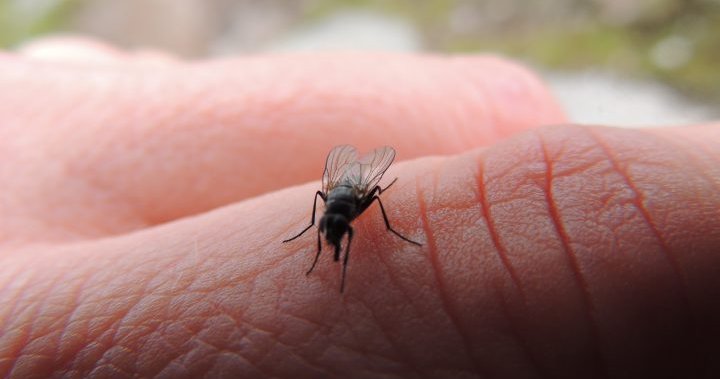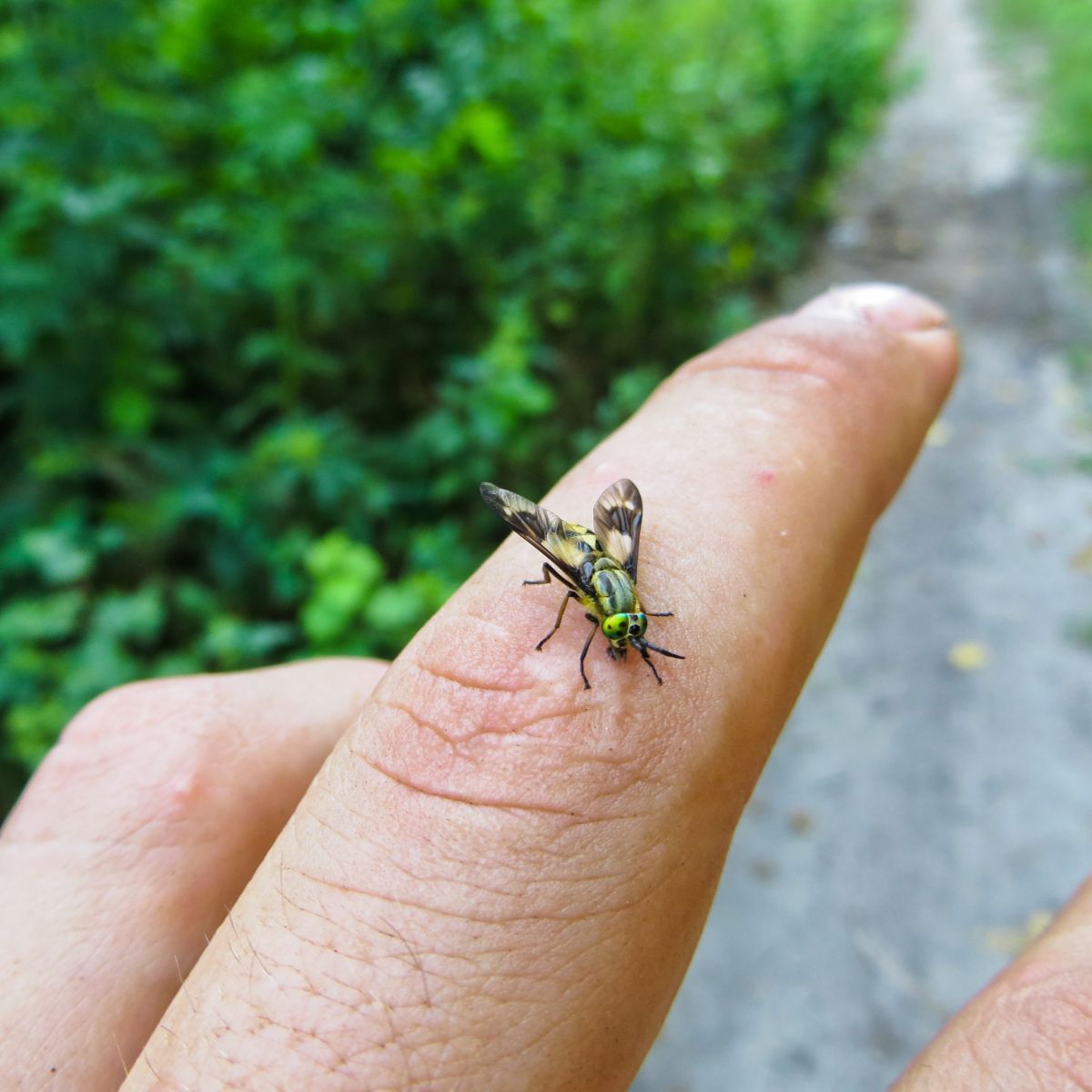Allowing flies to land on you is generally not a health concern. Flies do not bite or sting in the same way that mosquitoes or other insects do, so they are not likely to directly harm you in that manner.
However, flies can carry and transmit diseases because they often come into contact with unsanitary substances such as garbage, feces, and decaying organic matter.
One fly landing on your skin might not hurt immediately, but it’s important to stay clean and avoid flies, especially when they carry germs.
Flies can transfer bacteria and other microorganisms from contaminated surfaces to your skin, posing a health risk if you touch your face or consume food without washing your hands.
Health Risks Associated with Flies Landing on Your Skin
Disease Transmission: Flies can have different germs that can make you sick, like bacteria, viruses, and parasites.
When flies touch your skin, they can give you these germs, which might cause infections if they get inside your body.
Eye and Mucous Membrane Irritation: Flies are attracted to the moisture and secretions on the body, which may lead them to land on your eyes, nose, mouth, or other mucous membranes.
This can cause irritation and discomfort and could also introduce pathogens into these sensitive areas.
Allergic Reactions: Some people might be sensitive or allergic to fly saliva or poop proteins. When they touch flies, it can cause things like skin rashes, itching, or other allergic reactions.
Fly-Borne Diseases and Transmission:

Foodborne Illness: Flies are known to land on human and pet food items and can transfer pathogens from unsanitary surfaces to these items. When contaminated food is consumed, it can lead to gastrointestinal infections, such as food poisoning.
Disease Vectors: Flies, particularly species like the housefly, are considered mechanical disease vectors.
They can pick up pathogens from sources like decaying matter, garbage, sewage, and animal feces and then transmit these pathogens to humans by landing on their skin or food. Some of the diseases associated with fly transmission include:
- Cholera: Flies can pick up cholera bacteria from contaminated water or food and then transmit the disease when they land on or near humans.
- Dysentery: Pathogens causing dysentery, like Shigella, can be spread by flies.
- Salmonellosis: Salmonella bacteria, which cause food poisoning, can be transmitted by flies from contaminated food to humans.
- Typhoid Fever: Flies can carry and transmit Salmonella Typhi, the bacterium responsible for typhoid fever.
- Trachoma: A fly-borne disease that affects the eyes, leading to blindness in severe cases, particularly in regions with poor sanitation.
Wound Infections: Flies can lay their eggs in open wounds, leading to the infestation of maggots in the tissue. This can cause severe infections and complications.
Statistics and Studies Related to Fly-Borne Diseases:
Although connecting specific cases of foodborne illnesses to flies is tough, many studies have looked into how flies can spread diseases. Here are some important findings and stats about diseases carried by flies:
- A study in ‘Applied and Environmental Microbiology’ discovered that houseflies can carry more than 100 types of harmful microorganisms, like bacteria, viruses, and parasites.
These findings highlight the potential for flies to act as vectors for disease transmission.
- The World Health Organization (WHO) points out that flies play a part in spreading diseases like cholera, dysentery, and eye infections worldwide, particularly in places with inadequate sanitation and hygiene.
- According to the Centers for Disease Control and Prevention (CDC), foodborne illnesses impact millions of people in the United States annually.
While not all of these cases can be directly attributed to flies, they underscore the importance of food safety measures in preventing such illnesses.
- The Food and Agriculture Organization (FAO) and the World Health Organization (WHO) have shared food safety guidelines stressing the importance of safeguarding food from pests like flies to avoid foodborne illnesses.
To reduce the risks associated with flies:
- Practice good hygiene, such as frequent handwashing, to prevent the transfer of pathogens from flies to your body.
- Cover food and maintain clean cooking and dining areas to prevent food contamination.
- Use screens and netting to keep flies out of living spaces.
- Eliminate breeding sites for flies by proper waste management and sanitation practices.
- In regions where fly-borne diseases are prevalent, public health efforts may include fly control programs to minimize the transmission of these diseases.
FAQs
Can flies transmit diseases when they land on you?
Yes. Flies can transmit diseases by picking up germs from various surfaces and transferring them when they land on you.
Do flies bite or sting when they land on you?
No. Most common house flies don’t bite or sting, but there are exceptions with certain fly species.
Are there any benefits to letting flies land on you?
No. There are no significant benefits to allowing flies to land on you, and it’s generally best to avoid it.
Can flies lay eggs on your skin when they land on you?
No. Flies do not lay eggs on human skin; they require specific conditions on decaying organic matter.
Do flies prefer to land on certain parts of the body?
Yes. Flies may be attracted to areas with sweat or moisture, so they might land on exposed skin or areas with body heat.
Can flies sense fear or nervousness and land on you more?
No. Flies cannot sense human emotions like fear or nervousness.
Is it harmful to your health if a fly lands on your skin briefly?
Not usually. A brief landing by a fly is unlikely to cause immediate harm, but it’s best to maintain hygiene to minimize health risks.
Should you swat or shoo away flies when they land on you?
Yes, you should swat or shoo away flies when they land on you to prevent potential health risks.
Can fly landing patterns vary based on the type of fly?
Yes. Different fly species have different behaviors and landing patterns, with some being more persistent than others.
How can you prevent flies from landing on you?
Yes. To prevent flies from landing on you, use insect repellents, wear protective clothing, and maintain clean and hygienic conditions to minimize their attraction.
Conclusion
In conclusion, the decision of whether to let flies land on you should be based on a balance between personal comfort, cultural norms, health awareness, and individual choice.
However, it’s generally best to avoid letting flies land on you, and you should also take measures to keep your living spaces clean and free of these insects to minimize potential health risks.
Regardless of your approach, maintaining good hygiene practices and taking appropriate measures in regions with known health risks remain important aspects of fly management.











